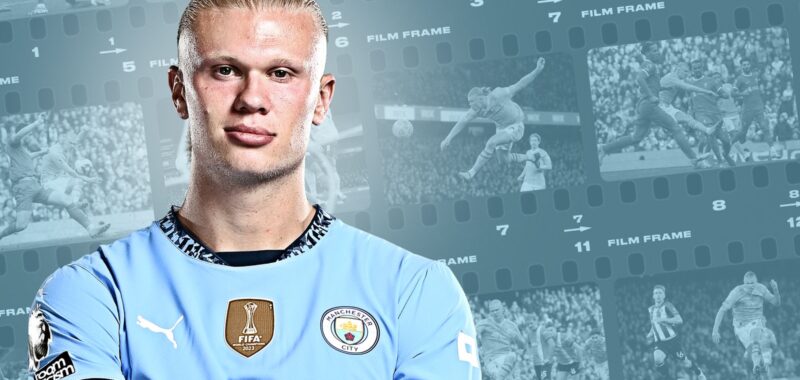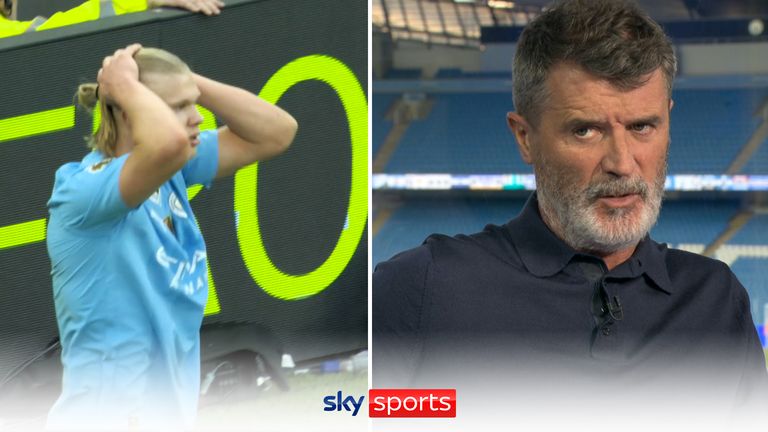A staggering statistic came to light following Manchester City’s opening-day victory at Chelsea. Erling Haaland became the first player to complete just three passes whilst playing 90 minutes under Pep Guardiola – the game’s chief proponent of total football. Just three.
The revelation added fuel to the fire of an inquest that has been ongoing almost since Haaland joined Man City in 2022. Can a striker really be considered world class if he barely ever touches the ball?
Haaland has been scrutinised – more so recently – for averaging low touch counts in games. In fact, his touch count is the lowest of any player to score three or more goals in Europe’s big five leagues since the start of last season – and yet, his personal goal tally is mind-blowing.
A zoomed-out approach is best here.
Against Ipswich, the week after scoring in a 2-0 win at Chelsea, the Norwegian international completed as many passes as he took shots on goal (seven). The end product was a Haaland hat-trick in a 4-1 win.
Journey forward to this season’s first international interlude, Haaland has amassed seven Premier League goals. No other striker in the division has even managed seven shots on target.
To contextualise further – after Haaland registered another trio of goals against West Ham in matchweek three – his average hat-trick count has shot up to one in every 9.7 games, while his six touches per shot remains the lowest of any player in Europe.
He has now scored more Premier League trebles than Wayne Rooney. He’s level with Thierry Henry, Michael Owen and Harry Kane. He’s three shy of Alan Shearer, and four behind Sergio Aguero’s total of 12. Surely, it’s only a matter of time before that record is obliterated too. And this season he has the chance to be the first player since Henry in 2004 to win the Golden Boot three years running.
All this from a man who, in Roy Keane’s words, sometimes plays like a “League Two player” outside the box. “His general play is so poor, he has to improve that”, Keane said when Man City drew 0-0 with Arsenal last March. Question is, does that really matter?
And if Haaland, the modern game’s most prolific scoring machine, does not meet the composition – or rather, football’s romanticised view – of the perfect No 9, then who does?
Haaland proves No 9 is not an exact science
Key attributes of the archetypal striker differ from manager to manager, pundit to pundit – beauty is in the eye of the beholder, after all – but most depictions will refer to many of Haaland’s best strengths. In that sense, he is textbook.
Strong, physical presence, pacey, direct and purposeful with movement, aggressive in the press, aerially smart, and lethal between the width of the goal-frame. Even deadlier inside the six-yard box.
Jamie Redknapp believes Haaland has “brought strikers back into fashion. Compare him with Aston Villa’s Ollie Watkins, for example – another standout performer of the 2023/24 season – and the assertion rings particularly true.
Watkins won the Premier League’s award for ‘playmaker of the year’, registering the most assists (13), while Haaland won the Golden Boot for outscoring every competitor by at least five goals.
Watkins, within Unai Emery’s fluid system, is actively encouraged to drop deep to get involved in team play, but scored eight fewer goals than his Manchester City counterpart. The England international also generated lower expected goals, fewer shots on target, took a lower percentage of his touches in the opposition box and forced fewer high turnovers.
Not even the trendiest of No 9s – perhaps with the exception of Kane, who scored 36 Bundesliga goals for Bayern Munich last year – can compete with Haaland’s immense strike rate. Nor his ability to almost exclusively reserve all of his best work for the final third, in and out of possession. He is encouraged to do so now more than ever.
Haaland’s main point of difference, beyond the goals, is his positional discipline, trusted to avoid the majority of ball progression and build-up phases, in favour of being the ultimate finisher.
“My job isn’t to be like Rodri, to control a game. It’s being in the box and finishing the attacks,” he told Sky Sports on opening weekend. “Do I need to be that more involved? That’s the million-dollar question.”
Recent evidence would suggest not.
Affecting the game without touching the ball?
Few strikers, if any, possess the fear factor that Haaland carries. His presence is enough to unsettle and unnerve even the steeliest of defenders.
Teams adapt to the threat of what he might do, before he actually does anything at all.
Haaland knows, and Guardiola respects, that he is a monster inside the 18-yard box – the best in world football – but seldom a world-class operator outside it. Nor does he need to be.
Back in May, Haaland himself reminded doubters of an important facet of his game. “In the end, you can play football without touching the ball,” he said.
“You can do it with movements, the mental part, and the awareness. If I can stretch centre-backs with a run, it’s hard, but it’s my job.”
He’s right.
Instead of sulking in frustration, chasing play, and seeking deeper involvement in areas of the pitch he cannot score – England fans berated Kane for such behaviour at Euro 2024 – Haaland bides his time. He waits, delays, lingers, perhaps feigns disinterest. And just when the timing is right, he fires up.
It’s an art few have a great appreciation for. The ability of a player to punish any team who dare doubt his prosperity, even if he has spent a large percentage of a match relatively anonymous.
“His movement is so smart,” said Micah Richards on Saturday Night Football recently. “The speed at which he does things makes it so difficult to defend against. Once you get into a race with him, it’s over.”
This season, it’s meant Haaland has been more clinical than ever, with ruthless efficiency. Seven goals from an xG of 3.77. His personal tally is greater than any teams’ ‘goals for’ column.
Guardiola is unsurprisingly impressed too. “I like when he runs a lot. I like when he presses like an animal,” the manager said after beating West Ham.
“There’s no central defender [that can stop him], not even with a gun. He’s so fast, so powerful.”
Surrounded by craft and creativity
Why would us, mere mortals, dare challenge Man City’s near-perfect process? They have won 19 of their 22 Premier League games in 2024 – drawing three. And Haaland is at the centre of such a formidable formula.
Put simply, surround Haaland with enablers and he’ll do the rest. City’s squad is packed with technicians, those that operate to service him. It’s telling that Haaland is the only player listed as a ‘forward’ on the club’s official website.
His uniqueness is deserving of its own category.
“What we need is the team to play better and better to give him [Haaland] more balls in the final third,” Guardiola said last weekend.
“With Rico [Lewis], Kevin [De Bruyne], [Ilkay] Gundogan, Bernardo [Silva], [James] McAtee, we’re going to create those situations because they’re really good in small spaces.”
Add Phil Foden, Jeremy Doku, Savinho and Jack Grealish to that list.
Would a focus on involvement in the pre-goal phase ultimately benefit Haaland? Or would it serve to overcomplicate what is already the slickest operation around?
“He’s playing much better in everything,” Guardiola added. “The details, he stays 20 minutes or half an hour after training sessions. I’m really pleased for him.”
Haaland was pretty good before. Scary to think he looks even better now.
Watch Manchester City vs Arsenal, live on Sky Sports Premier League, on Sunday, September 22; kick-off 4.30pm









